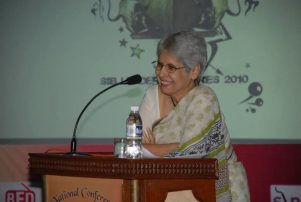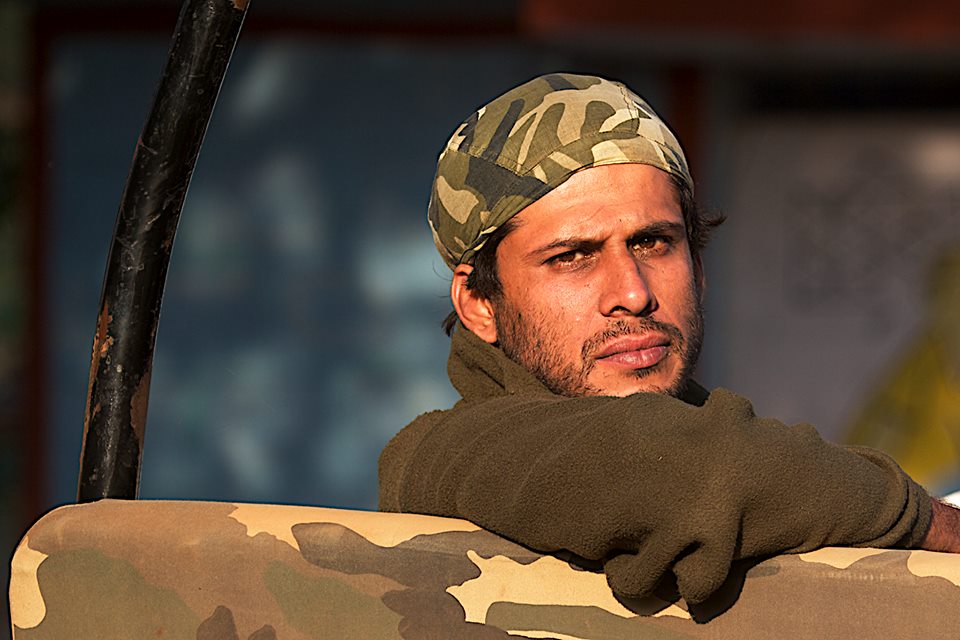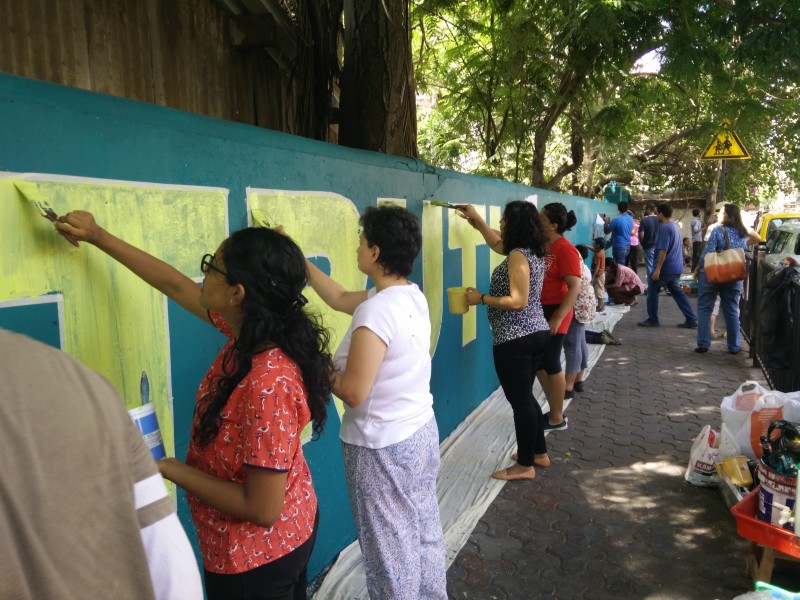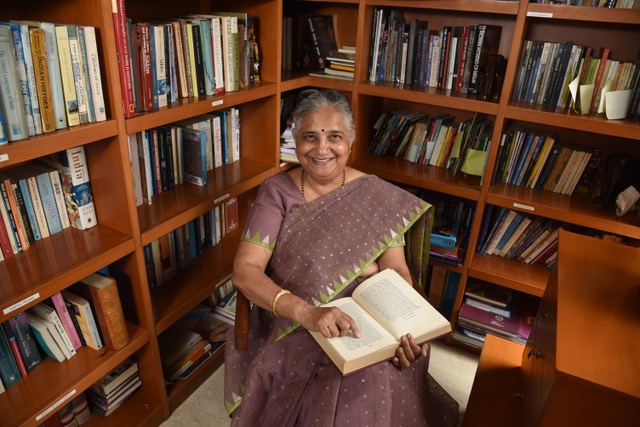Re-examining Corporate India’s Social Responsibility: In Conversation with Padma Shri Anu Aga
Article By Manjula Nanavati
 Mrs. Anu Aga emanates the serenity of one who has successfully steered her life out of turbulence and is at peace with the cards that life dealt her, and the choices she has made along the way. Her petite frame however, is monumentally deceptive for she is a colossal force to reckon with.
Mrs. Anu Aga emanates the serenity of one who has successfully steered her life out of turbulence and is at peace with the cards that life dealt her, and the choices she has made along the way. Her petite frame however, is monumentally deceptive for she is a colossal force to reckon with.
She is a pioneer of corporate social responsibility in India, having set up the Thermax Social Initiative Foundation long before government legislation instituted CSR requirements. Having earned the prestigious Padma Shri, she is perhaps one of India’s most influential philanthropists and serves on the boards of Akanksha and Teach For India, as well as a variety of parliamentary forums for Law and Justice, Public Grievances, and Women’s Empowerment.
We met at her Pune office to explore her pioneering spirit. Here are excerpts from our conversation.
Anu Aga: Soon after my husband died, I took over as chairperson of Thermax. The Indian economy was going through a downturn and our company performance suffered. My executives insisted, “Don’t worry, when the economy turns around we will do well After all, since you own 62% of the company it affects you the most.” Unfortunately I bought that argument. Then I received an anonymous letter from a shareholder saying, “Mrs. Aga – I feel Thermax has let me down. And you have let me down.” This letter gave me sleepless nights and I realized I had been foolish to accept that explanation from my executives. That’s when I decided I could no longer sit on my hands.
The Acropolitan (TA): So your mindset at that time was that Thermax needed to make as much profit as possible?
Anu: Well if you’re in business you owe it to your shareholders to make a profit. After all you’re not in business for charity. But having made a profit, how you use it is an entirely different thing.
TA: So would you say that profit is just a means rather than an end?
Anu: I believe that the purpose of business is human wellbeing. But I don’t think it’s an either profits or human wellbeing situation. It has to be both. You can make profits by running a humane organization. To increase profits by unethical means is not acceptable.
TA: How does one engender this conscientious idealism nationally, in both an individual and corporate capacity?
Anu: I think if people are genuine and really want to do something…it’s possible. By and large, I don’t think corporations really want to do something about it because they stand to gain from this status quo. Individually it’s more difficult, but business groups like CII and FICCI could collectively decide to fight corruption; that would be effective because the government would be powerless if we all join hands. I think a dialogue between government and businesses is important. At the very least, honest people should not be forced into corruption by the system.
TA: It must take a lot of courage to put ethics above profit…
Anu: It is very difficult. But at the end of the day you have to live with yourself. There are some forms of corruption that are extremely difficult to fight. Our turnover has suffered tremendously because we do not want to take short cuts. But sometimes we are forced to, because running a 100% honest business is next to impossible. As a family we feel very strongly that we must have a moral code. My late husband used to say that profit is not a set of numbers, but a set of values. Today our entire board and executives are all convinced that profit at any cost, is just not worth it.
TA: So business organizations are not just stand-alone entities in a corporate rat race. But they have a social responsibility?
Anu: Yes. This responsibility dictated our choice of sphere of activity. We do not deal in liquor or cigarettes; we have chosen energy and environment because they are socially relevant. Moreover, my father, husband and son always believed that our wealth should not be used for our personal consumption only; that a large part of our earnings must by applied toward social causes. But it was only after my husband’s death, after we went public, that we had profits in hand and my daughter and I could take that vision forward.
I met Shaheen Mistry in Mumbai and brought Akanksha to Pune, where we ran centers to augment the education that children from low-income families were receiving in public schools. Shortly we recognized that if we ran the schools themselves, we would have much more influence on the quality of education and values that the children were receiving. We now run 7 schools in Mumbai and 8 in Pune. The next step was to influence the education system itself, and Teach For India took up that mission. Based on our experience in India, this model has spread to 40 countries where the biggest costs are borne by the government, including the stipend paid to fellows and the cost of their residency. But we get no help from our government and our budget for the next year is Sixty-Five Crores. But I honestly feel that when you’re doing something good, money will never be a problem. I have complete faith in that.
TA: But when resources are scarce and one is consumed with meeting basic needs, it must become harder to take individual responsibility for the larger collective. So perhaps with great power comes great responsibility?
Anu: Absolutely. But I think everyone is capable of doing something. It could be money, time, talent, or management resources. At some level it is relatively easier to write a cheque and think your responsibility is over.
TA: So you believe every human being has a social responsibility regardless of resources?
Anu: I can’t be prescriptive. But I believe that as human beings we are all connected to each other. So how can you be isolated and think only of yourself? Self indulgence must have a limit. Again it’s a personal choice but I feel when you connect to each other by reaching out, how ever it might be, it is truly fulfilling. You wouldn’t think twice before reaching out to your family; can you extend this idea of family to the human race? Yet I too limit myself by geographical boundaries. With my resources I cannot reach out to women in African countries for example, where I know there is a crying need. But I have drawn a line, and each one has to decide where their boundaries lie.
TA: And each one can strive to extend our boundaries beyond the limits that we have drawn?
Anu: That would be wonderful! And in my experience, the more you extend these boundaries the happier you become.
TA: And how do you define happiness? Is it a state of mind? Something that is within?
Anu: Perhaps I take material comforts for granted because I’m blessed with abundance. Without a home to live in, would I be able to espouse this philosophy? I don’t know. But the reality is that I have more than enough to fulfill my needs. I can afford to have my happiness criteria emanating from within. To me happiness is the achievement of goals that I have set for myself, having meaningful relationships with people I care for, and living a life that is not knotted up with regrets. Spreading happiness begins with your own wellbeing because the more water a pot contains the more water it can give to others.
TA: You have confronted death and battled devastating grief and yet found strength in the midst of adversity to achieve so much. What allowed you to be able to do this so successfully?
Anu: While a lot of people have difficulty with their past, I was worried about how will I manage the future and the company. I didn’t think I deserved to be chairperson. I felt I was in that position only because of my majority shareholding. I kept devaluing myself.
Vipassana philosophy tells us everything is impermanent. I have come to believe that all of this is a game, an illusion. And the less attached you are to things and people, the more you can take life in your stride. I read a lot of books about death after my husband died and then when my son died it was very, very difficult. But somehow god had prepared me for it through my daily meditation and reading.
The sun rises and sets. We don’t clap our hands in jubilation each time it rises and go into deep mourning when it sets; we have accepted this cycle as a matter-of-course. However, we have not accepted the cycle of life and death. All of us are going to die; yet our lack of preparedness and knowledge makes us view this as a tragedy. To me, what is inevitable cannot be a tragedy. When you cannot live peacefully with people who matter, when you do not invest in yourself while you are alive, that is a tragedy.
TA: What can we do to prepare ourselves better for life, as well as death? There is such a wealth of knowledge that has come down to us through ancient wisdom…
Anu: Philosophy by itself can sometimes become purely an intellectual pursuit. Will philosophy alone help you to come to terms with death? I doubt it, because it’s your heart that has to heal and that cannot happen through intellect alone. Philosophy can make you think, and my reading certainly helped me. But what healed me was my heart, and that was not a cognitive process.
TA: That’s why it is essential to live and practice philosophy so that it travels from the realm of your mind and emanates from your heart.
Anu: But you know for most people when life is going smoothly they don’t feel the need to take time out for something that is not a priority. The priority is acquisition, one-upmanship…unfortunately if these are our priorities then we are heading for trouble.
TA: You have said you believe in God.
Anu: I’m not a religious person though I was born Zoroastrian, and I do go to the fire temple. But it doesn’t mean anything special to me. I don’t feel God there. Sometimes though, when you cannot make sense of things on earth, I feel there must be someone up there that has a master plan. Just like when you scold a child, the child may think you are cruel; but you have a plan and your intention is good. So too, God’s intention is good. You come to this life to experience what you have chosen to experience, be it death, poverty, or disability. So you might think: why is Anu suffering so much? But I think of it as an opportunity, a learning process. And when you take the perspective of a thousand rebirths, of what significance is this little pinpoint of time here. But the beauty of life is that each one must find his own meaning. There is no right or wrong answer. You must keep searching to discover what makes sense to you.
TA: Is there an important lesson you have learned that our readers could benefit from?
Anu: Please don’t make me larger than life. I’ve stumbled and failed numerous times. Every journey wavers and you take a few steps backwards before you can go forward again. Although we shun difficult moments, it is precisely when we are pushed into a corner that the best within us is set free. We can choose to remain stuck in the corner, full of self-pity, or we can realize that there is a whole room available for us to move through and explore.
And that is something we have to do for ourselves. The external world can help you a little bit. But the most important thing we have to realize is that we all have our own personal power to tap into, an internal force that we can strengthen by investing in ourselves.“Our stay on Earth is short, our roles dispensable, and our impact inconsequential.” If we can bring down our egos, if only a little, and stop thinking the world revolves around us, it would make a huge difference to our lives and the lives of those close to us.
Image Credits: By Nsnehasingh | Wikimedia Commons | CC BY 4.0
The entity posting this article assumes the responsibility that images used in this article have the requisite permissionsImage References
By Nsnehasingh | Wikimedia Commons | CC BY 4.0
Permissions required for the publishing of this article have been obtained




What do you think?